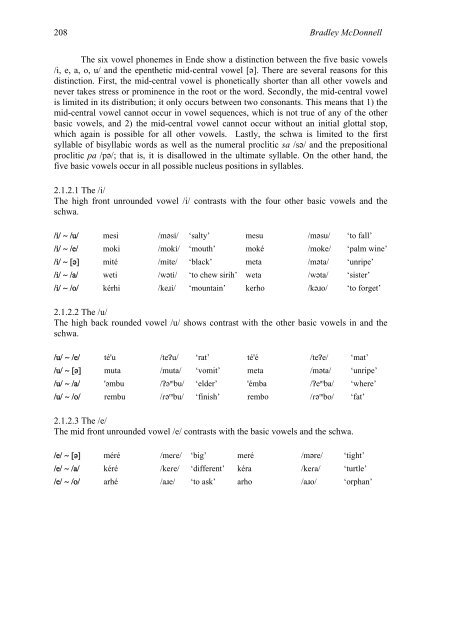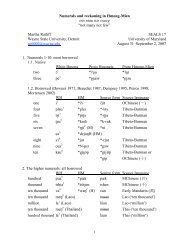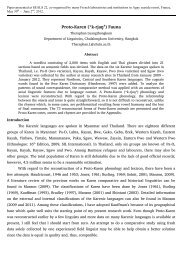proto-southwestern-tai revised: a new reconstruction - seals 22
proto-southwestern-tai revised: a new reconstruction - seals 22
proto-southwestern-tai revised: a new reconstruction - seals 22
Create successful ePaper yourself
Turn your PDF publications into a flip-book with our unique Google optimized e-Paper software.
208 Bradley McDonnell<br />
The six vowel phonemes in Ende show a distinction between the five basic vowels<br />
/i, e, a, o, u/ and the epenthetic mid-central vowel [�]. There are several reasons for this<br />
distinction. First, the mid-central vowel is phonetically shorter than all other vowels and<br />
never takes stress or prominence in the root or the word. Secondly, the mid-central vowel<br />
is limited in its distribution; it only occurs between two consonants. This means that 1) the<br />
mid-central vowel cannot occur in vowel sequences, which is not true of any of the other<br />
basic vowels, and 2) the mid-central vowel cannot occur without an initial glottal stop,<br />
which again is possible for all other vowels. Lastly, the schwa is limited to the first<br />
syllable of bisyllabic words as well as the numeral proclitic sa /s�/ and the prepositional<br />
proclitic pa /p�/; that is, it is disallowed in the ultimate syllable. On the other hand, the<br />
five basic vowels occur in all possible nucleus positions in syllables.<br />
2.1.2.1 The /i/<br />
The high front unrounded vowel /i/ contrasts with the four other basic vowels and the<br />
schwa.<br />
/i/ ~ /u/ mesi /m�si/ ‘salty’ mesu /m�su/ ‘to fall’<br />
/i/ ~ /e/ moki /moki/ ‘mouth’ moké /moke/ ‘palm wine’<br />
/i/ ~ [�] mité /mite/ ‘black’ meta /m�ta/ ‘unripe’<br />
/i/ ~ /a/ weti /w�ti/ ‘to chew sirih’ weta /w�ta/ ‘sister’<br />
/i/ ~ /o/ kérhi /ke�i/ ‘moun<strong>tai</strong>n’ kerho /k��o/ ‘to forget’<br />
2.1.2.2 The /u/<br />
The high back rounded vowel /u/ shows contrast with the other basic vowels in and the<br />
schwa.<br />
/u/ ~ /e/ té'u /teɁu/ ‘rat’ té'é /teɁe/ ‘mat’<br />
/u/ ~ [�] muta /muta/ ‘vomit’ meta /m�ta/ ‘unripe’<br />
/u/ ~ /a/ 'əmbu /Ɂəmbu/ ‘elder’ 'émba /Ɂemba/ ‘where’<br />
/u/ ~ /o/ rembu /ɾ�mbu/ ‘finish’ rembo /ɾ�mbo/ ‘fat’<br />
2.1.2.3 The /e/<br />
The mid front unrounded vowel /e/ contrasts with the basic vowels and the schwa.<br />
/e/ ~ [�] méré /meɾe/ ‘big’ meré /m�re/ ‘tight’<br />
/e/ ~ /a/ kéré /keɾe/ ‘different’ kéra /keɾa/ ‘turtle’<br />
/e/ ~ /o/ arhé /a�e/ ‘to ask’ arho /a�o/ ‘orphan’





